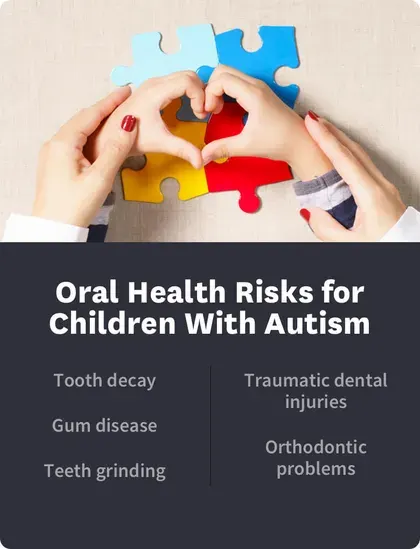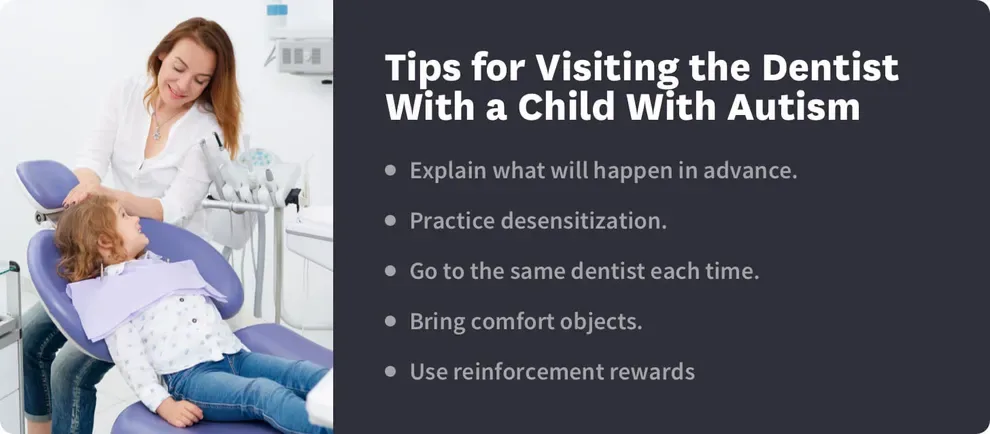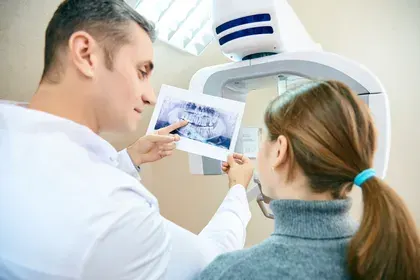A Guide to Dental Care for Children with Autism
Table of Contents
- Dentists with Special Training
Children with autism are likely to suffer many more oral health problems, including tooth decay, gum disease and dental injury, than children without autism. Many autistic kids have sensory sensitivities that make it difficult to maintain an effective oral hygiene routine. These issues may also make visits to the dentist challenging.
Parents and caregivers can do several things to make oral hygiene and dental visits easier for their autistic kids. Implementing behavioral techniques, using autism-friendly dental products, and seeking out dental professionals with specialized knowledge can all help your child with autism maintain good oral health.
Children with Autism Face Increased Oral Health Risks
Children with autism can face a handful of issues related to their oral health. Among them:

They may have difficulty tolerating the sensory inputs involved in brushing and flossing, leading them to skip these necessary tasks.
They may engage in behaviors that endanger the teeth and gums, such as head banging and gum picking.
There is some evidence that children with autism also prefer to eat soft, sweet foods. These types of foods often promote tooth decay. Parents may also give children with autism candies and other sweet foods as rewards for good behavior.
Because of these challenges, these kids are at greater risk of developing many different oral health conditions, including:
Tooth decay
Gum disease
Teeth grinding, especially at night (known as bruxism)
Traumatic dental injuries
Orthodontic problems
The combination of negative habits with the increased likelihood of gum and teeth issues as a result make bi-annual trips to the dentist more of a priority for these children.
General Oral Health Tips
Daily oral hygiene tasks might be more difficult for children with autism, but they are essential for protecting their teeth and gums. Experts have developed some useful strategies to help children with autism maintain good oral health.
Show your child how to brush and floss properly with a live demonstration. First, brush and floss your own teeth in front of them, showing them exactly what each step looks like. Then, perform those same action on them, letting them watch what you’re doing in the mirror.
Recommended Oral Hygiene Products
Plenty of oral hygiene products on the market can help children with autism address the set of unique struggles they face. Some of these include:

Special toothbrushes. Regular toothbrushes may too harsh for kids with autism. Choose a brush with extra soft or silicone bristles for a gentle experience.
Non-foaming or differently flavored toothpaste. Many children with autism find unflavored and non-foaming toothpastes more tolerable than typical mint or cinnamon flavors. Others enjoy child-friendly flavors like fruit punch and bubblegum.
Flavored floss. Many children with autism strongly object to using mint-flavored floss. Have them try out a few different flavors of floss to see if any of them are more acceptable to your child. If none of them work, a water flosser might be better suited to your child's needs.
Timers. Children with autism often want to get brushing over with as soon as possible, so they may struggle to brush for the entire two-minute period that dentists recommend. Offer them some sort of timer to help with this: this could be a small hourglass, a kitchen timer, a stopwatch, or even a built-in timer on their toothbrush.
Visiting the Dentist
Visiting the dentist can be stressful for children with autism. Here are a few ways to make this process easier for both you and your child.

Children with autism do better in unfamiliar situations when they know what to expect. Sit your child down and explain what happens at the dentist. If you aren’t sure if you’ve covered every step of the process, ask your dentist for guidance.
Dentists’ offices are full of new sights, sounds, and smells that children with autism may find overwhelming at first. Desensitization can help them get used to this environment. Have your child practice sitting in the dentist’s chair quietly for a few minutes before their appointment begins. Then have them sit with their mouth open for a while. Gradually work up to having the dentist work inside their mouth. Some dentists offer special desensitization appointments to make this process easier for parents.
Going to the same dentist for every dental visit gives your child a chance to get used to that office environment and the staff who work there. Over time, they will likely become more comfortable in that location and may not find visits as challenging as they did at first.
Children with autism can often be soothed by comfort objects like a favorite stuffed toy, a weighted blanket, or a piece of moldable putty. Bring one of your child’s favorite items to the dentist with them and offer it to them while they are sitting in the chair. For safety reasons, be sure to remind them that they must keep this item on their lap and away from their face while the dentist is working.
Try offering your child a sticker, pencil, craft item, special meal, or other small incentive after a successful trip to the dentist’s office. If your child is very resistant to dental visits, you can break the visit down into steps with a separate reward for each one.
Dentists with Special Training
Some dentists receive special training to help them better serve patients with autism. They will then advertise the certifications they received by successfully completing this training to let parents know that their practice is autism-friendly.
For instance, a dental office can become a Certified Autism Center by completing coursework from the International Board of Credentialing and Continuing Education Standards.

When a dental office holds this certification, it means that their staff have been given additional training on topics like:
How autism affects their patients
How to be empathetic to this population’s needs
How to accommodate those needs with specific tools and strategies
If your child is having a very difficult time with routine dental visits, consider taking them to an office with staff who hold some sort of autism-related credentials. These professionals may be better equipped to meet your child's needs.
Resources for Parents and Kids
Many organizations have published dental health resources for parents and caregivers of children with autism. Here are some helpful selections to get you started.
The University of Washington School of Dentistry has published a fact sheet on how to handle dental appointments, as well as how to keep your child’s teeth and gums healthy at home.
This guide from the Canadian Dental Association offers tips on oral health care for people with developmental disabilities, including children with autism.
This step-by-step guide from the US Department of Health and Human Services helps caregivers figure out the best way to handle daily oral hygiene tasks for people with developmental disabilities.
This one-page guide from the Special Olympics describes how to properly brush and floss using simple instructions and helpful visual aids. It also includes instructions on how to modify these practices for people with limited dexterity, which can sometimes be useful for children with autism.
